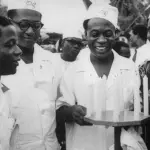By Lisa Vives, Global Information Network
NEW YORK (IDN) — Dr. Martin Luther King Jr., in anguish over the extreme violence displayed at the aftermath of the legendary Montgomery bus boycott, found solace in Ghana which he visited with his wife Coretta Scott King at the invitation of the newly installed Prime Minister Kwame Nkrumah.
Alongside African American leaders including A. Philip Randolph, Adam Clayton Powell and Ralph Bunch, MLK was there to observe Ghana’s independence ceremony. It was March of 1957.
Once back home, MLK preached with special joy, clearly invigorated over what he observed.
“I could hear that old Negro spiritual crying out: ‘Free at last, free at last, Great God Almighty, I’m free at last,’” he told his congregation in his “Birth of a New Nation” sermon in Alabama. “I stood there thinking about so many things. Before I knew it, I started weeping. I was crying for joy.”
King’s voyage was symbolic of a growing global alliance of oppressed peoples and was strategically well timed; his attendance represented an attempt to broaden the scope of the civil rights struggle in the United States.
At the inauguration ceremony, the formerly incarcerated Nkrumah and his ministers wore their prison caps, symbolizing their struggle to win Ghana’s freedom. King wrote: “When I looked out and saw the prime minister there with his prison cap, that reminded me of the fact that freedom never comes easy. It comes through hard labor and it comes through toil”.
Later, King attended the official ceremony in which the British Union Jack was lowered and the new flag of Ghana was raised and the British colony of the Gold Coast became the independent nation of Ghana.
He later recalled, “As we left the ceremony, we noticed all over the polo grounds almost a half a million people. They had waited for this hour and this moment for years”.
“Ghana tells us that the forces of the universe are on the side of justice… An old order of colonialism, of segregation, discrimination is passing away now.”
Later, in December 1964, MLK would have the opportunity to speak with South Africans when he stopped in London on his way to receive the Nobel Peace Prize in Oslo.
“If I lived in South Africa today in the midst of the white supremacy law in South Africa, I would join Chief (Albert) Luthuli and others in saying ‘break these unjust laws’… Our nation in a sense came into being through a massive act of civil disobedience because the Boston Tea Party was nothing but a massive act of civil disobedience.”
“Racism is no mere American phenomenon,” he said. “The classic example of organized and institutionalized racism is the Union of South Africa. Its national policy and practice are the incarnation of the doctrine of white supremacy in the midst of a population which is overwhelmingly Black.”
Albert Lutuli, an African nationalist and Zulu chief, was recognized nationally and internationally for his involvement in the fight against apartheid in South Africa. Although Lutuli and Martin Luther King, Jr., rarely worked closely together, they were mutual admirers. In 1959, after reading Stride Toward Freedom, King’s account of the Montgomery bus boycott, Lutuli told a friend that it was the “greatest inspiration”.
And King responded in a letter of December 1959: “I admire your great witness and your dedication to the cause of freedom and human dignity. You have stood amid persecution, abuse, and oppression with a dignity and calmness of spirit . . . One day all of Africa will be proud of your achievements”. [IDN-InDepthNews – 18 January 2022]
Photo: After the release of Convention Peoples’ Party (CPP) leaders from prison in 1951. From left to Right: Kojo Botsio, Kwame Nkrumah, Komla Agbeli Gbedemah and Kofi Baako. NB: The PG symbol written on their cap stands for Prison Graduates. It was a popular title for these freedom fighters. Credit: Ghanaian Museum, Sep 8, 2021


